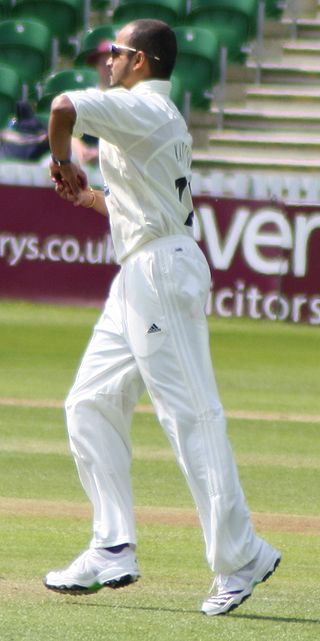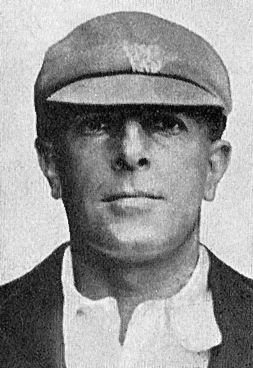Related Research Articles
Roger Clive Davis is a Welsh former county cricketer who played for Glamorgan for 13 years as an all-rounder. While having a quiet career from his debut in 1964 until 1970,he then enjoyed five years of greater success,including scoring over 1,000 runs in the 1975 season,before a rapid decline in 1976 which saw him dropped from the team. He nevertheless enjoyed a successful career,with over 7,000 runs and 241 wickets in first-class cricket. He became headline news in 1971,when a ball hit him on the side of the head while he was fielding in the dangerous "short leg" position,causing his heart and breathing to stop.

Chris Zinzan Harris is a former New Zealand cricketer who became,over the course of the 1990s,a folk-hero in New Zealand cricket. Harris was a member of the New Zealand team that won the 2000 ICC KnockOut Trophy.

Murali Kartik is a Cricket commentator and former Indian cricketer who sporadically represented the national team from 2000 to 2007. He was a slow left-arm orthodox bowler. He was not selected for international matches during his prime years due to the presence of Anil Kumble and Harbhajan Singh in the Indian squad. A left-handed batsman who had some success with the bat at first-class level with 21 half-centuries,Murli was not able to repeat such performances at international level.

Charles George Macartney was an Australian cricketer who played in 35 Test matches between 1907 and 1926. He was known as "The Governor-General" in reference to his authoritative batting style and his flamboyant strokeplay,which drew comparisons with his close friend and role model Victor Trumper,regarded as one of the most elegant batsmen in cricketing history. Sir Donald Bradman—generally regarded as the greatest batsman in history—cited Macartney's dynamic batting as an inspiration in his cricket career.

Roger Charles Blunt was a cricketer who played nine Test matches for the New Zealand national cricket team.

Frederick Theodore Badcock was a New Zealand first-class and Test cricketer. Perhaps the best all-rounder in New Zealand in the inter-war period,he played seven Test matches for New Zealand between 1930 and 1933,including New Zealand's inaugural Test in 1930. He was the first players capped by New Zealand.
John Trevor Sparling is a former New Zealand cricketer who played in 11 Test matches between 1958 and 1964.

Paul Ernest McEwan is a former New Zealand Test and ODI cricketer who played in four Tests and seventeen ODIs from 1980 to 1985. He played domestic cricket for Canterbury from 1977 to 1991. In the early 1990s,he set up the Canterbury Neonatal Unit Trust.
This article describes the history of New Zealand cricket to 1890.
During the 1882–83 New Zealand cricket season,the first class cricket consisted of six matches:an Auckland team went on a tour in December including three games,two in the South Island and in Wellington on the southern tip of the North Island,and three further local clashes.
Stewart James Storey is a former English cricketer. He was an all-rounder,a right-handed middle-order batsman and right-arm medium pace bowler as well as being a fine slip fielder. He played for Surrey from 1960 to 1976,winning the County Championship with them in 1971,and subsequently appeared for Sussex in 1978. He was readily recognisable on the cricket field by his fair hair.
Rex Clive Hooton is a former New Zealand cricketer who played first-class cricket for Auckland and Northern Districts. A right-hand bat and slow left-arm orthodox spin bowler,Hooton played 19 first-class matches from 1968 until 1980,and enjoyed some success with both the bat and occasionally with the ball. He scored three half-centuries during his career,as well as taking five wickets at a respectable 12.60.
Gareth Lawrence West is a former New Zealand cricketer for Central Districts cricket team,who played 26 matches in total from 2000 to 2004.

Leslie Charles Butler was a New Zealand cricketer. A left-handed batsman and slow left-arm spin bowler,Butler played as an all-rounder for Wellington between 1951 and 1967,scoring 1,396 runs and taking 120 wickets from 53 first class cricket matches. He was also selected for two first-class matches against the Marylebone Cricket Club as part of the New Zealand hosting team in 1961.

John Sydney Hiddleston was a cricketer who played for Otago,Wellington and New Zealand,from 1909–10 to 1928–29,in the years before New Zealand played Test cricket. He was born at Invercargill in Southland in 1890.
Joseph Clement Lawton was an English-born New Zealand cricketer and coach. He played first-class cricket for Otago from 1891 to 1894 and played in New Zealand's first representative match. He was the first coach engaged by a New Zealand cricket association.

Charles Harrington Broad was a New Zealand cricketer,rugby union player,and school teacher. He played eight first-class cricket matches for Nelson and Otago between 1888 and 1900,three representative games for the Nelson rugby team in 1894 and 1895,and was headmaster of Nelson College from 1922 to 1933.
The Australian cricket team toured New Zealand in late November and early December 1886.
The 2019–20 Plunket Shield was the 91st season of the Plunket Shield,the domestic first-class cricket competition in New Zealand. It took place between October 2019 and March 2020. As per the previous edition of the competition,the tournament was scheduled to feature eight rounds of matches. Central Districts were the defending champions.
The 2022–23 Plunket Shield was the 94th season of the Plunket Shield,the domestic first-class cricket competition that was played in New Zealand. The tournament started on 18 October 2022,and the final round of matches was played in March 2023. Auckland were the defending champions,having won their 24th title the previous year.
References
- ↑ "Player Profile: John Cushen". CricInfo. Retrieved 2008-11-19.
- ↑ McCarron A (2010) New Zealand Cricketers 1863/64–2010. Cardiff: The Association of Cricket Statisticians and Historians. ISBN 978 1 905138 98 2 (Available online at the Association of Cricket Statisticians and Historians. Retrieved 2023-06-05.)
- ↑ "First-Class Matches played by JAJ Cushen". CrickerArchive. Retrieved 2008-11-19.
- ↑ "Canterbury v Otago - Plunket Shield 1967/68". CricketArchive. 1968-01-11. Retrieved 2008-11-19.
- 1 2 3 4 5 6 7 8 9 10 11 12 "First-class Batting in Each Season by John Cushen". CricketArchive. Retrieved 2008-11-19.
- 1 2 3 4 5 6 7 8 9 10 11 12 13 "First-class Bowling in Each Season by John Cushen". CricketArchive. Retrieved 2008-11-19.
- 1 2 3 4 5 6 7 8 9 "ListA Batting and Fielding in Each Season by John Cushen". CricketArchive. Retrieved 2008-11-19.
- 1 2 3 4 5 6 7 8 9 10 "ListA Bowling in Each Season by John Cushen". CricketArchive. Retrieved 2008-11-19.
- ↑ "Otago v Auckland Shell Trophy 1986/87". CricketArchive. 1987-02-07. Retrieved 2008-11-19.